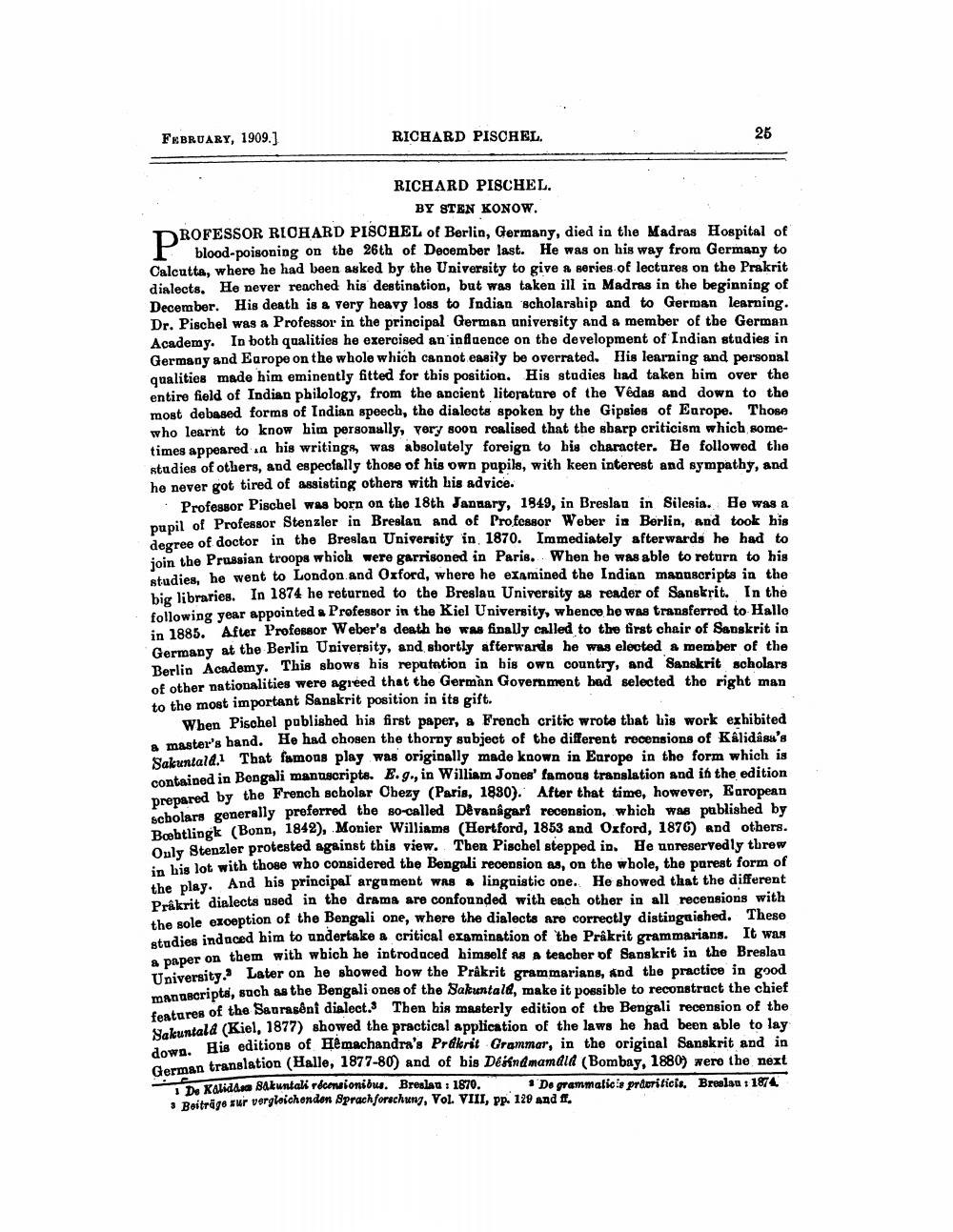________________
FEBRUARY, 1909.]
RICHARD PISCAEL.
RICHARD PISCHEL.
BY STEN KONOW. TROFESSOR RICHARD PISCHEL of Berlin, Germany, died in the Madras Hospital of
F blood-poisoning on the 26th of December last. He was on his way from Germany to Calcutta, where he had been asked by the University to give a series of lectures on the Prakrit dialects. He never reached his destination, but was taken ill in Madras in the beginning of December. His death is a very heavy loss to Indian scholarship and to German learning. Dr. Pischel was a Professor in the principal German aniversity and a member of the German Academy. In both qualities he exercised an influence on the development of Indian studies in Germany and Earope on the whole which cannot easily be overrated. Flis learning and personal qualities made him eminently fitted for this position. His studies had taken him over the entire field of Indian philology, from the ancient literature of the Vedas and down to the most debased forms of Indian speech, the dialects spoken by the Gipsies of Europe. Those who learnt to know him personally, very soon realised that the sharp criticism which sometimes appeared in his writings was absolutely foreign to his character. He followed the studies of others, and especially those of his own papils, with keen interest and sympathy, and he never got tired of assisting others with his advice.
• Professor Pischel was born on the 18th Janaary, 1849, in Breslan in Silesia. He was a pupil of Professor Stenzler in Breslan and of Professor Weber in Berlin, and took his degree of doctor in the Breslau University in 1870. Immediately afterwards he had to join the Prussian troops which were garrisoned in Paris. When he was able to return to his studies, he went to London and Oxford, where he examined the Indian manuscripts in the hic libraries. In 1874 he returned to the Breslau University as reader of Sanskrit. In the following year appointed a Professor in the Kiel University, whence he was transferred to Hallo in 1885. After Profossor Weber's death he was finally called to the first chair of Sanskrit in Germany at the Berlin University, and shortly afterwards he was elected a member of the Berlin Academy. This shows his reputation in bis own country, and Sanskrit scholars of other nationalities were agreed that the German Government bad selected the right man to the most important Sanskrit position in its gift.
When Pischel published his first paper, a French critic wrote that his work exhibited master's band. He had chosen the thorny subject of the different recensions of Kalidasa's Sakuntald. That famous play was originally made known in Europe in the form which is contained in Bengali manuscripts. E.g., in William Jones' famous translation and in the edition
nered by the French scholar Obezy (Paris, 1880). After that time, however, Earopean Scholars generally preferred the so-called Devanagari recension, which was published by Brahtlipgk (Bonn, 1842), Monier Williams (Hertford, 1853 and Oxford, 1870) and others. Only Stenzler protested against this view. Then Pischel stepped in. He unreservedly threw in his lot with those who considered the Bengali recension as, on the whole, the purest form of the play. And his principal argument was a linguistic one. He showed that the different Prakrit dialects used in the drama are confounded with each other in all recensions with the sole exception of the Bengali one, where the dialects are correctly distinguished. These etndies induced him to undertake a critical examination of the Prikrit grammarians. It was a paper on them with wbich he introduced himself as a teacher of Sanskrit in the Breslau University. Later on he showed bow the Prakrit grammarians, and the practice in good manuscripts, such as the Bengali ones of the Bakuntala, make it possible to reconstruct the chief Features of the Saurasóni dialect. Then his masterly edition of the Bengali recension of the Sakuntala (Kiel, 1877) showed the practical application of the laws he had been able to lay
His editions of Hêmachandra's Prakrit Grammar, in the original Sanskrit and in coman translation (Halle, 1877-80) and of bis Dérinamamdia (Bombay, 1880) were the next Xalida Bakuntali racorionibu. Breslau : 1870.
De grammatica prdoriticis. Breslau : 1874 3 Beiträge Fur vergleichondon Sprachforschung, Vol. VIII, pp. 120 and f.




